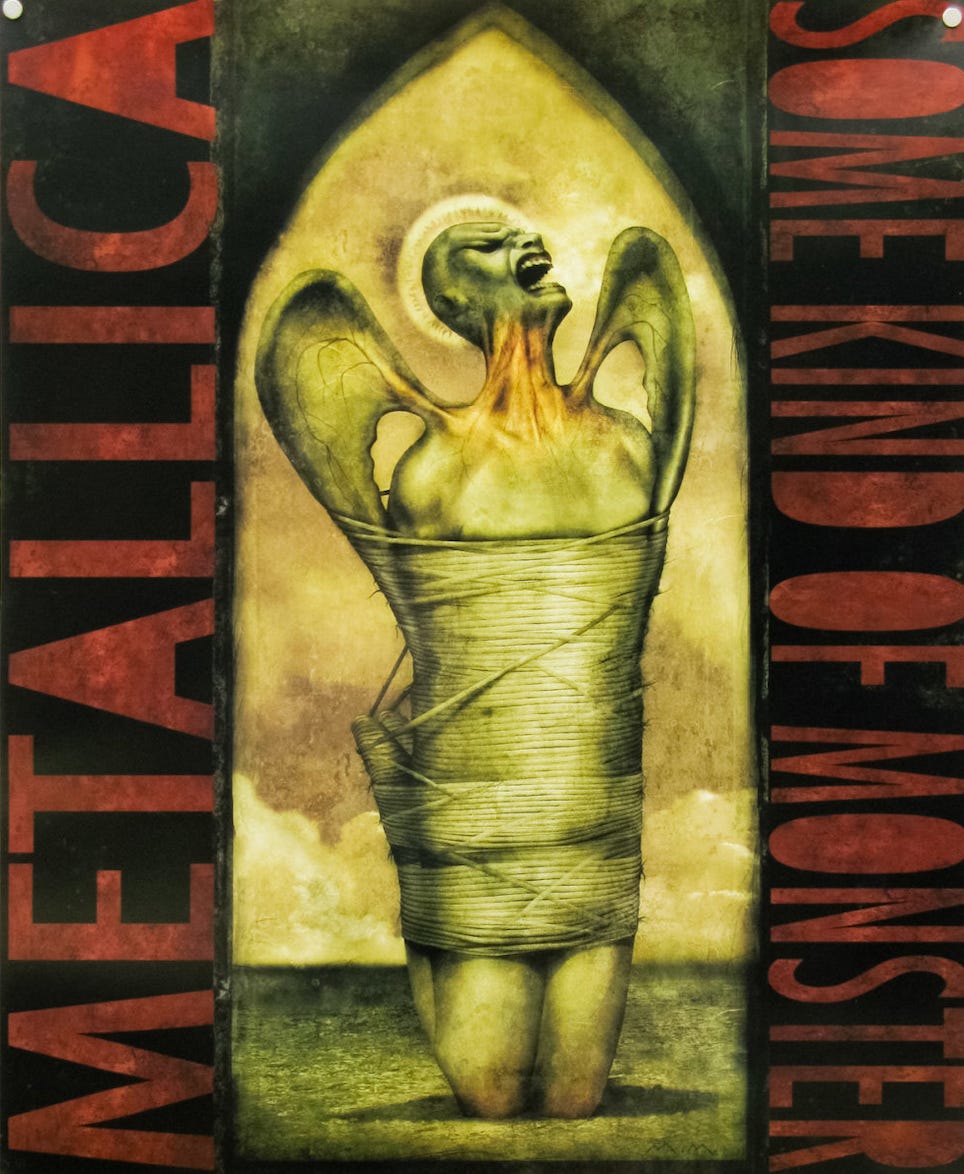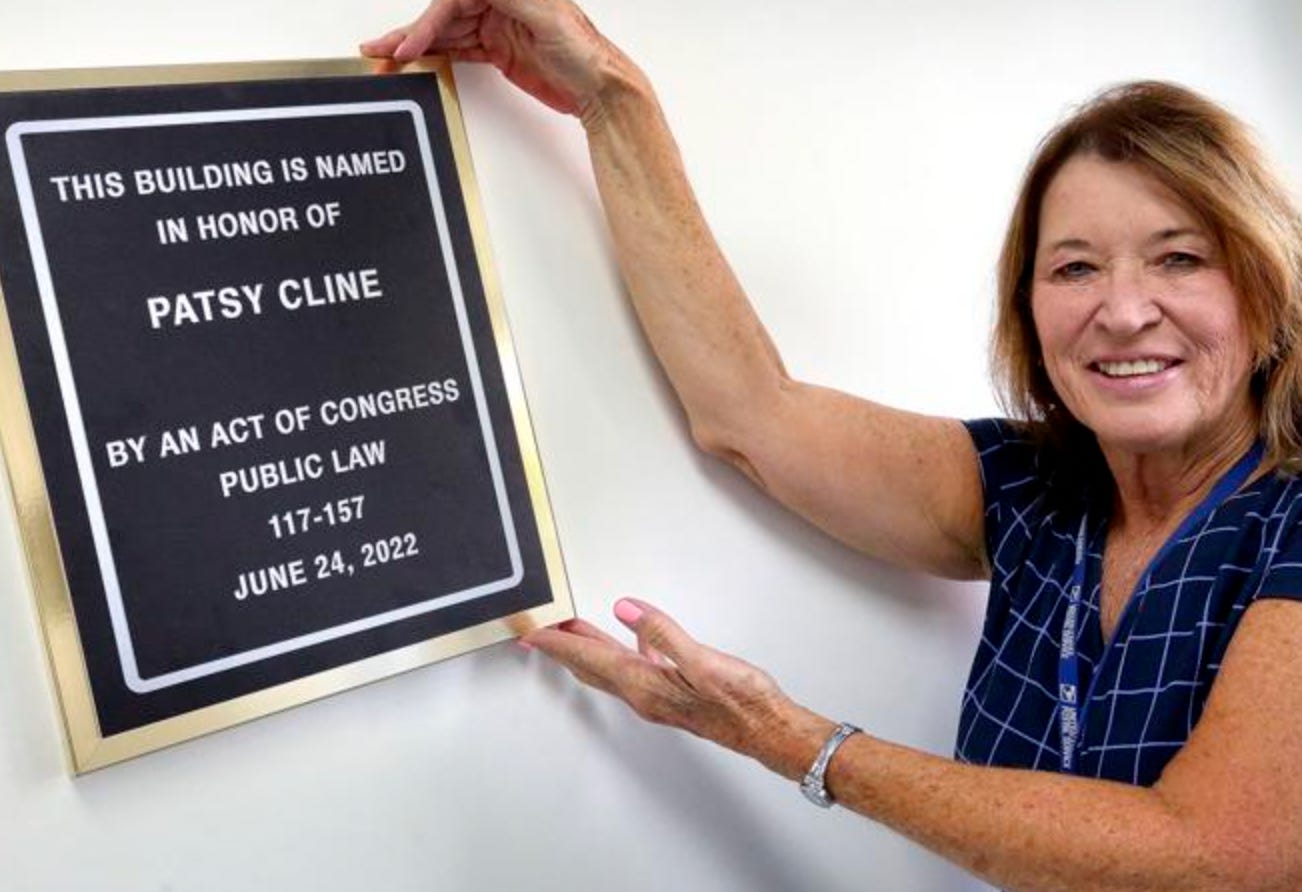The Cloud That Swallows Trust
“I decided to ride the lightning instead of extinguishing the light of life that had once shown out of my eyes.”— Carrie Fisher
For some reason I ended up watching Some Kind Of Monster over the long weekend, the documentary about the dark days of Metallica, after second bass player Jason Newsted left the band, when they hired a band-shrink to help them attempt to get over their deep-set interpersonal issues while singer James Hetfield put himself into rehab. They were at each other’s throats with a record to make with a producer they were paying 40K a month. I read heard great things about the documentary when it first came out, how it colorfully dove into the private side of a hugely successful band facing its own demons, with many a Spinal Tap moment thrown in as they pondered their existence, and it really did not disappoint.
The film revolves around the band’s sessions with Phil Towle, who works with music groups facing crisis getting so close to the group that he starts suggesting lyrics for songs in the studio. The film also features a lot of added commentary by drummer extraordinaire Lars Ulrich who comes off often buffoonish, always having sprawling opinions that barely make sense: whose talent is matched by his big mouth and caricature-ish posh lifestyle. The span of time in which the film takes place includes the moment when Ulrich became the spokesperson for the band attacking the music trading site Napster. While engaged in this battle, he publicly lists a group of Metallica fans who were using the platform to illegally download Metallica material. While the Grateful Dead and other bands used music trading tools to bring fans together and bolster their legacy, Metallica reacted by suing their fans. And they did so around the same time that Ulrich (in the film) sold his art collection for millions and millions of dollars…not because he was hurting for money, but just because he felt he was in a new chapter in his life.
I see the moment that Ulrich sued his fans for using Napster as a critical moment in the ending days of the classic music industry as we know it. Napster had become an incredibly successful venture, being used by millions of people to, yes, download content for free instead of paying for it. Interestingly enough, however, while music industry wide record sales were already on the decline BECAUSE of the new era of digital music consumption, when the new NSYNC record, No Strings Attached, was released in 2000, at the height of Napster’s usage, it both was the most downloaded record on the platform while racking up an incredible million copies sold in a day…2.4 million copies in a week (which, as Wikipedia states: “was a record for over fifteen years”). This Napster thing that the record labels could not understand: maybe, just maybe, it was the beginning of a whole new way of marketing music….it just needed to grow and evolve to suit everyone’s needs.
The record labels, who had raked in profit for years using tried and true marketing and distribution strategies, with ever-changing musical formats (78s-45s-LPs-8 tracks-cassettes-CDs) that often found consumers rebuying their collections…ignorantly scoffed at the new technologies afoot, with only a few relatively ignored voices from within suggesting that MAYBE these new companies MIGHT be the future of how to promote and sell music (I give Howie Klein at Reprise credit for understanding what was going on, with his old friend and staffer Jim Dickson on his ear supporting the digital future).
When Lars Ulrich and Metallica sued their fans, not only did they show themselves as complete selfish assholes whose lack of respect for their fans drove the band to actually taking them to court, but it also gave the record companies an iconic artist to hold up against the rising Silicon Valley musica technomica as to say, “look….the artists hate you as well.” With the wind from Metallica’s stench fanning their sails, the old school music corporations were able to shatter Napster and set up systems against other similar technologies. Did it stop like-minded music trading services from being developed? No. But they were developed away from the music companies, not with them. And even though the labels still held the music rights that ultimately the tech companies would need, an irrevocable divide was established between commerce, technology and art that is still hurting artists today.

It started with Metallica deciding to sue its fans and take down Napster, even though the band had already forged a multi-million dollar, consistently profitable company, owning mansions in opulent neighborhoods that were used as record and art storage bins, who could offer (documented in the film) their new bass player $1,000,000 upon joining just to show they were serious. They certainly were not facing poverty because the assumed loss of sales…and they were shortsighted in ignoring the marketing potential Napster offered.
That being said, the documentary also shows how great a musical band Metallica were (and probably still are)…and I say this as not someone you would call a fan. Each one of the original three members are incredible musicians who have a chemistry that when swinging can make incredible rock n roll…James Hetfield has a quintessential metal voice and is a powerful front man, and Kirk Hammett seems like just a good guy, a modest guitar god who seeks peace in the chaos of the Metallica experience. Even Ulrich shows himself the incredible drummer that defined the double-kick thrash style. I broke into their record Ride The Lightening after the film had finished: it is a brutal, powerful monster of a record; there is a reason they are loved.
But behind the music there also lies a darkness and a stupidity that, combined with power and success, caused some bad stuff to go down on an epic scale, stuff that is Unforgivable.
Drummie Zeb, lead singer of UK reggae band Aswad, dies aged 62
One of the best reggae bands to come out of the classic UK reggae first wave, Aswad put out some great music and found great success in their homeland. Zeb was one of the last remaining Aswadians when he passed. He also played drums on the incredible lovers rock hit, Silly Games (watch Steve McQueen’s Lovers Rock, where the song is gloriously featured). My favorite Aswad release is Hulet, which is oft not looked upon with the same excitement as their self-titles debut or 1981’s New Chapter….but to me, Hulet is the grooviest. Drummie Zeb RIP.
Tribute to WB Yeats with art installation near west London home
It is always a good thing to honor one of the greatest poets in history: “We’re set to unveil the artwork at the ‘gateway’ to the world’s first garden suburb with its beautifully conserved arts & crafts environment. This dazzling Yeats-inspired sculpture by artist and youngest ever Royal Academician Conrad Shawcross, comes with lines from the Yeats poem He Wishes for the Cloths of Heaven, engraved in a wide circular stone base.”
Shriek of the Week: Golden Plover, Call of the wild
More like The Shriek of Every Other Week, but ingenious nevertheless, this latest edition celebrating birdsongs is a complex beauty from the Golden Plover. You might even want to read the poem named after the bird by Wilfrid Wilson Gibson while listening.
Love and Magic; or, A Trip to the Circus--AN UNRELEASED ESSAY BY ISAAC BASHEVIS SINGER
The New Yorker recently published an essay by IBS that was written as an accompaniment of my favorite of his novels, The Magician of Lublin. It is one of many essays that has been gathered for a new Singer release, called Old Truths and New Clichés. The essay digs into the author’s fascination with magic…and really would have been a great accompaniment to his story (although it stands alone as a great read in itself).
Ruby Bridges, civil rights activist, writes children’s book
Today is civil rights activist Ruby Bridge’s birthday, which comes weeks after she announced a new children’s book looking at her childhood and the issues that helped shape her.
Ceremony marks renaming of downtown post office in Patsy Cline's honor
Bob Bartley, who owns the downtown post office building, recalled during the dedication having danced with Cline while music played on the diner's jukebox.
Attending the ceremony was "quite an exciting experience," said Cline's daughter, Julie Fudge….Fudge believes it appropriate for a post office building to be named after her mother….She was "an avid letter writer," Fudge said.
TEN YEARS LATER
By David Whyte
When the mind is clear
and the surface of the now still,
now swaying water
slaps against
the rolling kayak,
I find myself near darkness,
paddling again to Yellow Island.
Every spring wildflowers
cover the grey rocks.
Every year the sea breeze
ruffles the cold and lovely pearls
hidden in the center of the flowers
as if remembering them
by touch alone.
A calm and lonely, trembling beauty
that frightened me in youth.
Now their loneliness
feels familiar, one small thing
I’ve learned these years,
how to be alone,
and at the edge of aloneness
how to be found by the world.
Innocence is what we allow
to be gifted back to us
once we’ve given ourselves away.
There is one world only,
the one to which we gave ourselves
utterly, and to which one day
we are blessed to return.












